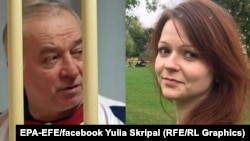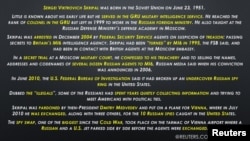The spy, whose allegiance Russia’s embassy in London is disputing, is Sergey Skripal. The 66-year-old Russian exile and his 30-year-old daughter, who was visiting from Moscow, were found unconscious on a bench in the British city of Salisbury on March 4. Both remain in intensive care in hospital and unconscious, in critical but stable condition.
U.K. Home Secretary Amber Rudd said, “That forensic analysis has revealed the presence of a nerve agent and the incident is therefore being treated as attempted murder.”
While Britain has not accused any Russian state actors of involvement in the poisoning, Britain’s foreign minister, Boris Johnson, Tuesday called Russia “a malign and disruptive force” and threatened new sanctions on Russia, if the Kremlin were found to have been responsible.
Johnson’s comment drew a share Russian rebuttal. Earlier government-linked media and politicians in Russia took a defensive stance, claiming in advance that the Russian state had nothing to do with the crime.
The Business Insider compiled a list of 15 deaths in Britain which intelligence authorities suspect could be involved Russia, including Alexander Litvinenko, a former officer in the Federal Security Service (FSB). He was poisoned by radioactive Polonium-210, believed to have been slipped into a cup of tea.
The Russian embassy’s claim that Skripal was a “British spy working for MI6” rather than a Russian spy is based on the fact that he was a double agent working simultaneously for both the Russian and British intelligence services.
Here is a short bio of Skripal compiled by Reuters:
While the Russian Embassy’s claim about the double agent is not completely wrong, it is inaccurate to imply that Skripal was not a Russian spy, and even now there are questions surrounding Skripal's allegiances.
Valery Morozov, another former Russian intelligence officer who now lives in exile in Britain, said Skripal was still working with Russian military intelligence.
“You have a Russian military intelligence officer working in the Russian diplomatic service, living after retirement in the U.K. working in cybersecurity and every month going to the [Russian] embassy to meet military intelligence officers,” Morozov told Channel 4 News.
Deepening the mystery of Skripal’s loyalties, the Telegraph newspaper claims it has obtained information that the poisoned spy was a close confidant of Christopher Steel, the British ex-spy who compiled the so-called “Trump dossier.”
And there is Vladimir Putin’s infamous reaction to the 2010 exchange of a group of captured Russian “illegals” – undercover spies – living in the United States for a group of Russian intelligence agents accused of working for the West, including Skripal.,Putin, who was then prime minister, said: "Traitors will kick the bucket. Trust me. These people betrayed their friends, their brothers in arms. Whatever they got in exchange for it, those 30 pieces of silver they were given, they will choke on them.”
Russia used a nerve agent in October 2002 when 912 people, many of them children, were held hostage in the Dubrovka theatre in Moscow for three days. Russian special forces filled the building with an unknown gas to neutralize the attackers, who had threatened to blow up the venue unless Russia pulled its troops out of Chechnya.
The effects of the gas killed 125 people. The 40 attackers were shot after being knocked out by the gas. The hostage-takers themselves killed five people. At the time the Russian authorities refused to identify the nerve agent, that, the first responders and hospital personnel said, prevented them from saving more lives of the affected hostages.






